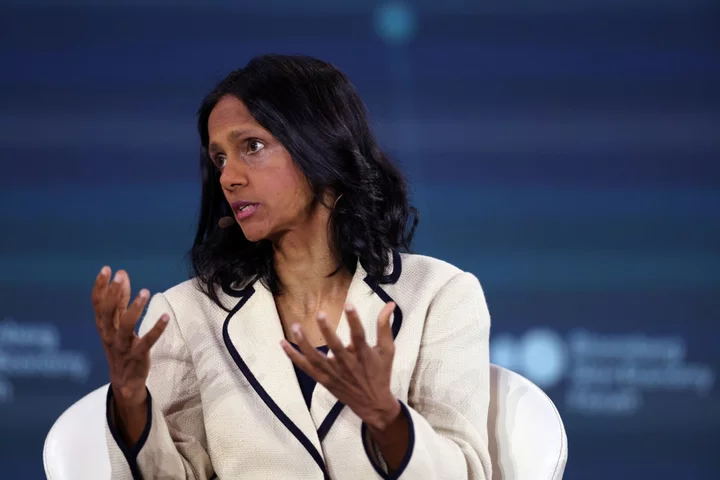Climate change, the energy transition and the financial plumbing needed to channel trillions of dollars toward green investment dominated discussions on the third and final day of the Bloomberg New Economy Forum in Singapore.
US Special Presidential Envoy for Climate John Kerry led the call for real progress at the COP28 summit starting later this month, stressing the importance of sticking to the goal of capping global warming to 1.5C.
“This year is going to be worse than last year, and next year is going to be worse than this year. It’s baked in with the rising temperatures,” Kerry said. “We will wind up with, sometime in this century, a low-carbon, no-carbon economy. What is not certain is that we will wind up there with the speed necessary to avoid the worst consequences of this crisis.”
Aminath Shauna, minister of environment, climate change and technology for the Maldives, an island nation that’s facing the threat of rising sea levels, described the need for action in personal terms.
“I don’t want to be a climate refugee, I don’t want my daughter to be a climate refugee” she said. “Finance is there, technology is there, what we need is the world and international organizations, governments, to identify and to say the climate issue is a climate crisis.”
Governments, businesses and investors will gather in Dubai for COP28 at the end of the month to discuss issues such as contributions to a fund to compensate global warming victims and whether to expand the pool of wealthy donor nations for climate finance.
A recent report by the Independent Expert Group sees $3 trillion needed per year by 2030 for developing countries, of which $1.8 trillion represents additional investments in climate action. The past 12 months have been the hottest on record as 99% of the world’s population experienced above-average warmth, according to new analysis.
What Are COP Meetings For? Does It Matter Who Hosts?: QuickTake
Mark Carney, chair and head of transition investing at Brookfield Asset Management, stressed the need to increase green capital flows into emerging countries. “That needs to scale from where it is today, at a couple hundred million, to a trillion of cross-border capital by the end of the decade,” said Carney, who is also chair of Bloomberg Inc.’s board. “Those are big, big numbers.”
Speaking on the same panel, Macquarie Group Ltd. Chief Executive Officer Shemara Wikramanayake pointed to the need for patience and progress at COP28, but also to the need for more climate investment opportunities with credible financial returns to match funds already mobilized.
“I would say the money we are investing is not charitable,” she said. “We have savers of the world, retirees — we have to get returns for risk. So we have to go on this journey of creating investments.”
Speakers including Kerry praised the US Inflation Reduction Act for attracting green investment. But the acclaim wasn’t universal: Li Zhen, chairman of Chinese battery maker Gotion High-Tech Co., said American companies will still have to interact with other companies in the world, adding that he is “very confident” that Gotion can escape being declared a foreign entity of concern in the IRA.
“I don’t think the Inflation Reduction Act or other policies can completely stop companies from going global,” he said. “Companies thrive through competition, not through subsidies.”
EV Market’s Surge Toward $57 Trillion Sparks Global Flashpoints
Geopolitical issues dominated conversations on day one of the forum, with Singapore Foreign Minister Vivian Balakrishnan saying the world is facing a “moment of danger.”
John Waldron, president and chief operating officer of Goldman Sachs Group Inc., said inflation remained the single-biggest risk to the global economic outlook.
Day two turned to new technologies such as artificial intelligence and how they will change the way we live and work.
“Generative AI is the next new thing in machine learning,” Citadel founder Ken Griffin said Thursday.
AI will lower the cost of creating blockbuster animated movies drastically, according to longtime industry executive Jeffrey Katzenberg. Julian Ma, the founder and CEO of Inceptio Technology, said fully autonomous trucks — which he called “freight robots” — would become a reality in future, with no driver and dispatched and managed virtually from the cloud.
The New Economy Forum was organized by Bloomberg Media Group, a division of Bloomberg LP, the parent company of Bloomberg News.
Read More From the New Economy Forum:
- UBS Chief Ermotti Doesn’t See Cultural Clash With Credit Suisse
- AI Will Cut Cost of Animated Films by 90%, Jeff Katzenberg Says
- Clinton Says Israelis and Palestinians Need New Leadership
- Griffin Says Peace Dividend Over, High Inflation to Last Decades
- China Unlikely to Launch ‘D-Day’ on Taiwan, Singapore PM Says
- Goldman, GIC Differ on Whether Inflation Is Risk or Opportunity
- China Vice President Sees ‘Positive Signals’ in Ties With US
- Saudi Minister Says Israel Talks Hinge on Palestinian Question
Author: Malcolm Scott, Tassia Sipahutar and Stephen Stapczynski

